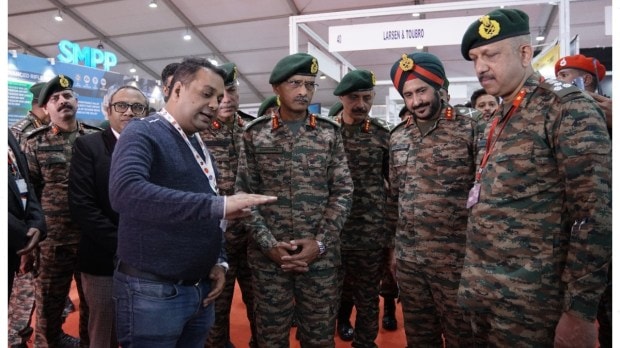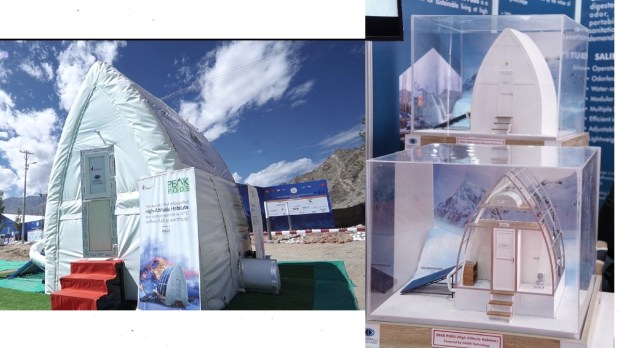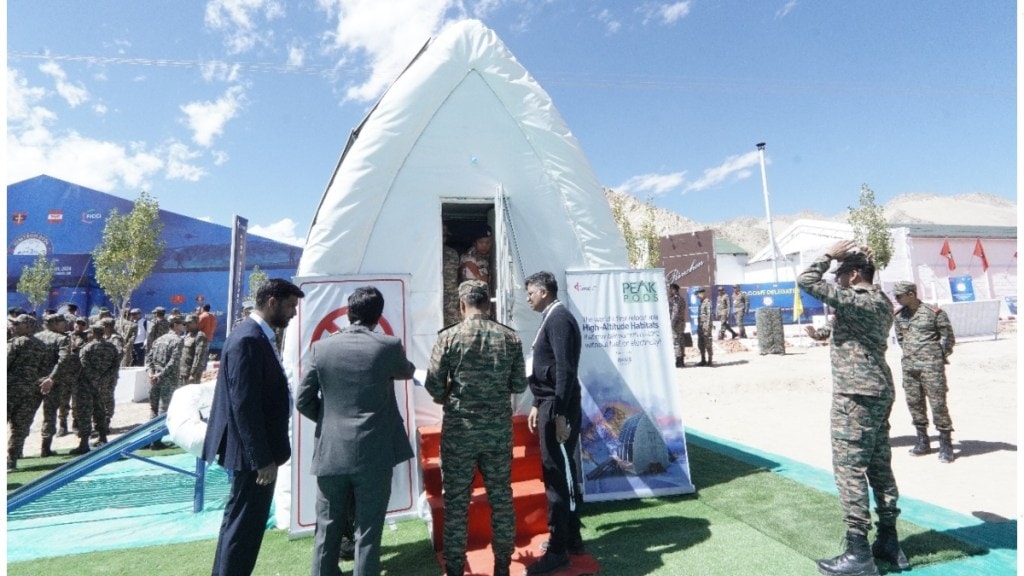The Indian Army is currently conducting trials of Peak Pods, a revolutionary high-altitude habitat in the harsh terrain of Ladakh. These cutting-edge shelters are specifically designed to provide a safe and sustainable living environment for soldiers stationed in extreme cold regions, where temperatures can dip as low as -40°C.

The introduction of these pods designed by DTECH 360 INNOVATIONS, marks a significant step towards improving the living conditions of the army’s personnel in high-altitude regions, where traditional solutions often fall short.
Why Are High-Altitude Pods Required?
The Indian Army’s operations in high-altitude regions, such as those near the Line of Actual Control (LAC), require soldiers to endure prolonged periods in severe environments. Conventional shelters, while functional, present numerous challenges. They are often immobile, heavily reliant on kerosene heaters, and require frequent fuel supply runs—difficult tasks in remote, non-motorable regions. This not only increases logistical burdens but also creates risks like carbon monoxide poisoning and fire hazards.
Furthermore, traditional shelters often do not address issues such as snow accumulation or structural integrity in high wind conditions, leaving soldiers vulnerable to both the elements and potential safety hazards. The need for a solution that is both robust and adaptable to the extreme weather conditions of the Himalayas has become increasingly urgent.
Key Features of Peak Pods
Sustainable Climate Control: One of the most impressive features of Peak Pods is their ability to maintain an internal temperature of 15°C, even when external temperatures plummet to -40°C. Unlike conventional shelters that rely on fuel-based heaters, Peak Pods achieve this through an energy-efficient, solar-powered system, eliminating the need for external fuel sources.
Modular and Portable Design: Peak Pods are designed to be modular, allowing for quick assembly and dismantling. Their relocatable design means they can be easily transported and deployed in various terrains, making them ideal for military bases in high-altitude areas. This also ensures that no permanent foundation work is required, further enhancing their versatility.
Smart Technology Integration: The pods come equipped with intelligent climate control systems that automatically regulate internal temperatures, as well as oxygen and carbon dioxide levels. This ensures that soldiers remain comfortable and safe, even when stationed at extreme altitudes. The system is also energy-efficient, drawing power from solar panels to operate essential equipment such as lights, pumps, and charging stations.

Bio-Toilets and Basic Amenities: Peak Pods are equipped with bio-toilets that convert human waste into grey water, addressing the lack of proper sanitation facilities in remote areas. Other essential amenities, such as sofa beds, hot water tanks, and storage compartments for food and personal items, further enhance the pods’ suitability for long-term deployments.
Benefits for Indian Soldiers
The introduction of Peak Pods could significantly improve the quality of life for soldiers deployed in high-altitude areas. By reducing their reliance on fuel, these pods minimize the logistical burden of frequent resupply missions. Moreover, their sturdy design, capable of withstanding winds up to 190 km/h, and snow-resistant architecture ensures that soldiers can remain safe and operational during even the harshest winter storms.
Additionally, the smart climate control and self-sustaining energy systems allow soldiers to focus on their duties without the constant worry of maintaining warmth or accessing basic facilities. The portability of the pods also means that they can be quickly redeployed as the situation on the ground changes, offering the Indian Army greater flexibility in responding to tactical needs.
Future Prospects
The ongoing trials in Ladakh will determine whether Peak Pods become a permanent fixture in the Indian Army’s high-altitude operations. Should the results be positive, these habitats could replace traditional shelters, transforming how soldiers live and work in extreme conditions. DTECH 360 INNOVATIONS is already planning further advancements, including the integration of AI systems, renewable energy sources, and even atmospheric water generation, which could further enhance the pods’ capabilities.
